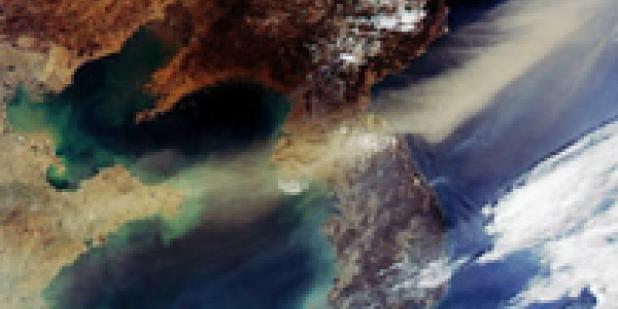Join us for a free one-day workshop for educators at the Japanese American National Museum, hosted by the USC U.S.-China Institute and the National Consortium for Teaching about Asia. This workshop will include a guided tour of the beloved exhibition Common Ground: The Heart of Community, slated to close permanently in January 2025. Following the tour, learn strategies for engaging students in the primary source artifacts, images, and documents found in JANM’s vast collection and discover classroom-ready resources to support teaching and learning about the Japanese American experience.
Yellow Dust Blows East: Contemporary South Korean Images of China
Dr. Stephen Epstein will analyze images of China in contemporary South Korea, drawing on television news, cyberspace commentary, advertisements, and books aimed at the popular market.
Where

Thursday, June 05, 2008
3:00 PM - 4:30 PM
2007 marked the fifteenth anniversary of diplomatic ties between China and South Korea. The speed with which the two countries have developed a web of ties in multiple spheres has surprised some, while others interpret the depth of connections as a return to a ''natural'' compatibility that experienced rupture as a result of Japan's occupation of Korea and the Cold War years that followed. And yet, centripetal and centrifugal forces coexist: despite multiple affinities and a popular discourse of mutual interest (Korean media reports on, e.g., China's bewitchment by ''The Korean Wave,'' and Korea's preoccupation with and predominance in the study of Chinese), potential for intercultural conflict and competition remains.
This talk analyses images of China in contemporary South Korea, drawing on television news, cyberspace commentary, advertisements, and books aimed at the popular market. While Korean commentators regularly point out that China's size and diversity makes it impossible to generalize about the country, patterns of thought do emerge: China as a living instantiation of Korea's past; China as a site for both Korean opportunity and self-congratulation about its own successes; and China as a country where the ''counterfeit'' reigns supreme. I will consider the extent to which reports on the springtime meteorological phenomenon of the hwangsa, the sands that blow over Korea from the Gobi desert, have come to function as an implicit metaphor for Korean understanding of China: an unstoppable juggernaut on its doorstep that brings pollution and poses a challenge to the livelihood and well-being of the nation.
Dr. Stephen Epstein is Director of the Asian Studies Institute and the Asian Studies Programme at the Victoria University of Wellington in New Zealand. He has published widely on contemporary Korean literature and society, and is currently working on a book exploring how globalization is transforming Korean identity and co-editing a volume on China-Korea relations. He has also translated several pieces of Korean and Indonesian fiction, including Yang Gui-ja's Contradictions (Cornell East Asia Series) and was a Translator in Residence with the Korean Literature Translation Institute in Seoul during 2007. The documentary he co-produced with Timothy Tangherlini , Our Nation: A Korean Punk Rock Community, has featured in numerous international festivals.
Featured Articles
Please join us for the Grad Mixer! Hosted by USC Annenberg Office of International Affairs, Enjoy food, drink and conversation with fellow students across USC Annenberg. Graduate students from any field are welcome to join, so it is a great opportunity to meet fellow students with IR/foreign policy-related research topics and interests.
RSVP link: https://forms.gle/1zer188RE9dCS6Ho6
Events
Hosted by USC Annenberg Office of International Affairs, enjoy food, drink and conversation with fellow international students.
Join us for an in-person conversation on Thursday, November 7th at 4pm with author David M. Lampton as he discusses his new book, Living U.S.-China Relations: From Cold War to Cold War. The book examines the history of U.S.-China relations across eight U.S. presidential administrations.




